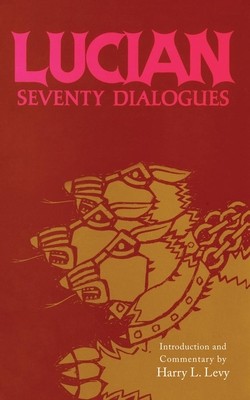
- We will send in 10–14 business days.
- Publisher: University of Oklahoma Press
- ISBN-10: 0806138947
- ISBN-13: 9780806138947
- Format: 12.7 x 20.3 x 2 cm, softcover
- Language: English
- SAVE -10% with code: EXTRA
Lucian (e-book) (used book) | bookbook.eu
Reviews
Description
This book contains all of Lucian's Dialogues of the Dead, Dialogues of the Sea-Gods, and Dialogues of the Gods, with introduction and explanatory commentary. The Greek text is from the Loeb Classical Library, Volume VII. The Greek sophist and satirist Lucian (ca. A.D. 120-ca. 190) was born in Samosata, on the Euphrates River, capital city of Commagene in northern Syria. The commentary approaches Lucian's language and the content of his work as examples of the process whereby a non-Greek was Hellenized linguistically and culturally. Lucian reversed the biblical adage by seeing Hellenism through a glass, brightly. The glass was his culture, which enabled him to stand apart and view the Greek classics from Homer on with a peculiar freshness; the brightness was supplied by his satirical spirit, inspired but not limited by his predecessor Menippus. His work was translated by Erasmus and Sir Thomas More, whose writings reflect the influence of Lucian's satiric dialogues.
EXTRA 10 % discount with code: EXTRA
The promotion ends in 14d.15:10:47
The discount code is valid when purchasing from 10 €. Discounts do not stack.
- Publisher: University of Oklahoma Press
- ISBN-10: 0806138947
- ISBN-13: 9780806138947
- Format: 12.7 x 20.3 x 2 cm, softcover
- Language: English English
This book contains all of Lucian's Dialogues of the Dead, Dialogues of the Sea-Gods, and Dialogues of the Gods, with introduction and explanatory commentary. The Greek text is from the Loeb Classical Library, Volume VII. The Greek sophist and satirist Lucian (ca. A.D. 120-ca. 190) was born in Samosata, on the Euphrates River, capital city of Commagene in northern Syria. The commentary approaches Lucian's language and the content of his work as examples of the process whereby a non-Greek was Hellenized linguistically and culturally. Lucian reversed the biblical adage by seeing Hellenism through a glass, brightly. The glass was his culture, which enabled him to stand apart and view the Greek classics from Homer on with a peculiar freshness; the brightness was supplied by his satirical spirit, inspired but not limited by his predecessor Menippus. His work was translated by Erasmus and Sir Thomas More, whose writings reflect the influence of Lucian's satiric dialogues.


Reviews